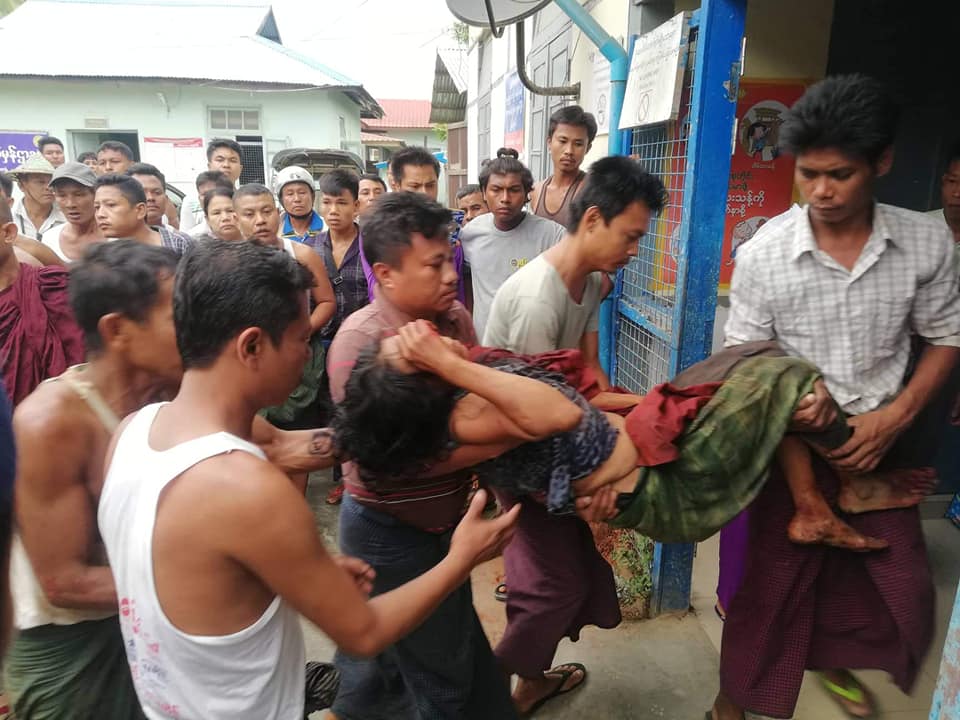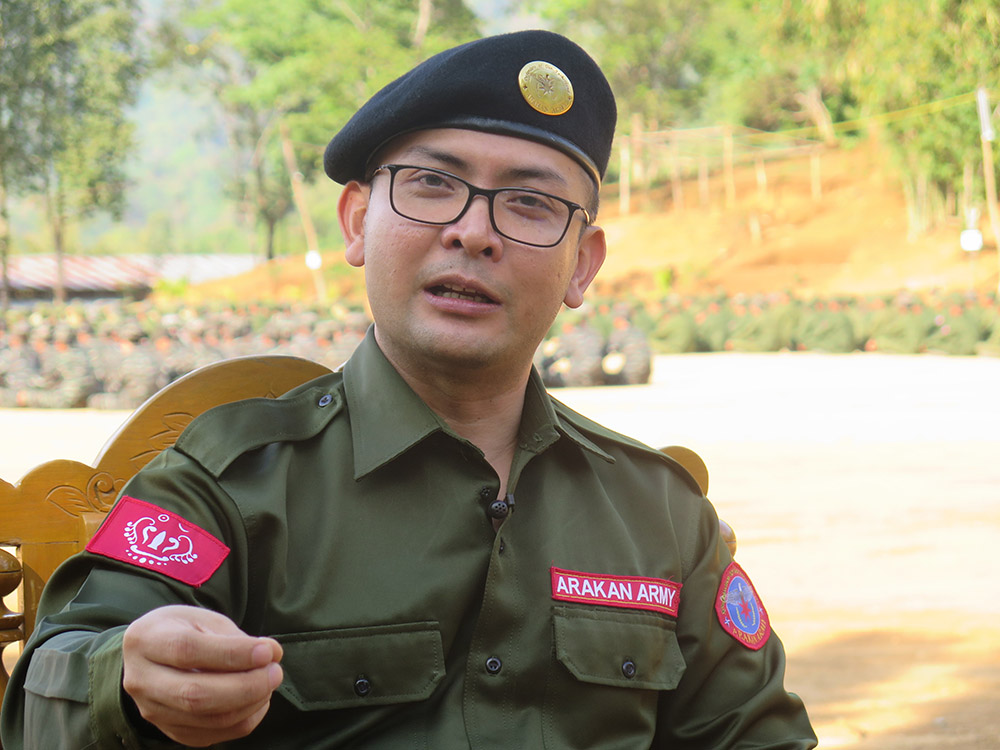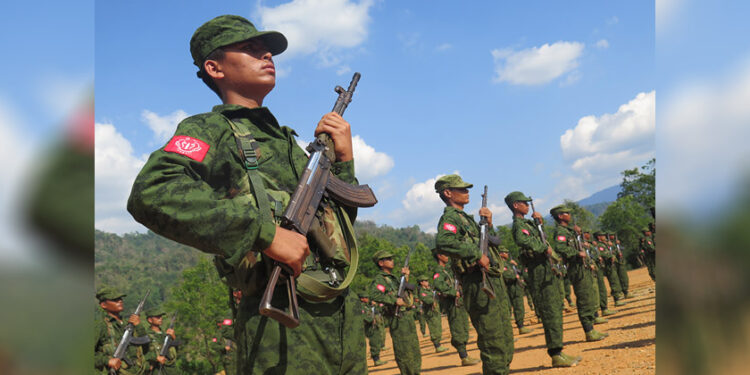PANGHSANG, Wa Self-Administered Region—With almost daily fighting taking place between the Myanmar Army and the Arakan Army (AA), the casualties on both sides are higher than we have seen on the news.
The Myanmar military (or Tatmadaw) is determined not to allow the AA to set up a base in northern Rakhine State. However, the ethnic armed organization has widespread public support in the state and has managed to hold out in the north.
Fierce fighting has broken out in Minbya Township, northern Rakhine, and several civilians have been killed. An AA sniper team has also been targeting Army officers, killing two battalion commanders, according to sources with the ethnic group. The Army has confirmed the deaths.
Rakhine leaders sympathetic to the AA cause say the rebels have stockpiled food and ammunition and are committed to holding out for two to three years.
The Army has sent reinforcements to northern Rakhine State and remains firmly on the ground to deter further attacks. But it seems it is also preparing for a long fight.
Amnesty International recently released a report titled “No One Can Protect Us” alleging that since fighting intensified in January, both Tatmadaw and AA troops have instigated violent clashes, carrying out extrajudicial executions, arbitrary arrests, torture of prisoners, enforced disappearances and destruction of historical sites.
An AA spokesman denied the accusations, saying the report lacked concrete evidence.
Open to Negotiation
The military has deployed the Army, Navy and Air Force to quell the Arakan Army’s strong but consistent offensive. It is expected that the fighting will escalate in Rakhine State and bring more instability to the region.
Recently, Major General Soe Tint Naing, who headed the Western Regional Command covering Rakhine and Chin states bordering Bangladesh and India, was transferred to the Northwestern Command, while the northwestern chief, Major General Phone Myat, replaced him in Ann, where the headquarters of the Western Command is located. Maj-Gen. Phone Myat, according to military sources, is more familiar with the terrain in Rakhine State. He served in the region in the past and it is believed he should be able to control the area. But the government and the Army are ready to open a dialogue.

Last month, Myanmar Army spokesman Brigadier-General Zaw Min Tun said the Tatmadaw vowed to crush the AA to end its insurgent activity, which it said targeted administrative mechanisms and security forces manning national border posts.
However, the Army has also said it is open to negotiation.
The Myanmar military has issued a guarantee of the safety of AA leaders who meet with government officials for peace talks in government-controlled areas, including the administrative capital of Naypyitaw. In addition to Naypyitaw, the government proposed as possible locations Myitkyina, Lashio and Yangon, but the AA would like any such meetings to take place in Panghsang (the headquarters of the United Wa State Army), Muse on the China-Myanmar border, or in Kunming, China.
“[The AA] said it is concerned about the security of its leaders because of the ongoing clashes, so we asked the military leaders, and the Tatmadaw said they will guarantee their safety, and that not a hair on their heads will be harmed,” U Zaw Htay, the director-general of the President’s Office, told reporters in Naypyitaw last month.
“Not just us, other members are also concerned about coming to Naypyitaw. It would be better if the venue is acceptable to both sides,” AA spokesman U Khaing Thukha said. “The military is launching [a] fierce offensive, and its policy is to crush us, so we have concerns,” he added.
The military extended its four-month truce for five military commands across the country, excluding Rakhine, by another two months for all military operations. It is believed that during Sen-Gen. Min Aung Hlaing’s visit to Beijing in April, China asked him to extend the army’s unilateral four-month ceasefire period.
Established in Kachin State’s Laiza, the AA leaders and soldiers learned their military skills and received training from the Kachin. Their cause is, like those of other ethnic armed groups, self-determination and greater autonomy. But the Army insists that the AA is based in Laiza, Kachin State, not in Rakhine State. Nonetheless, in northern Rakhine State the AA is rapidly expanding its territory.
In late April, the vice chairman of the Kachin Independence Council, General Gun Maw, told The Irrawaddy, “There is a need to negotiate. Rather than saying the AA should not enter Rakhine State, [the government] should negotiate with any group that enters Rakhine. It is more important to figure out how [the AA] can participate in building the country according to the wishes of the Arakanese people, and how [the government] can cooperate [with the AA]. It is no solution to ask the AA not to enter Rakhine; it is more important to figure out how to build the country.”
Support in Rakhine
The Arakan Army no doubt enjoys popular support and has recruited many young members including women to the armed group, which is now led by charismatic leader Major General Htun Myat Naing.
The Arakanese leader, who is 41 years old, is based in northern Myanmar and has received political and military backing from Kachin and Wa leaders. About 30 Rakhine youth led by Maj-Gen. Htun Myat Naing founded the AA and began to receive military training from the KIA in 2008 and 2009. It was a small, poorly equipped guerrilla unit at that time.

Today, the AA is growing and said to have around 3,000 members (some claim it has over 6,000 members) both in Rakhine State and in Kachin Independence Organization-controlled areas. They are now well equipped and this has also raised questions about funding sources. Some foreign observers see a connection to the growth of the illicit drugs trade around Myanmar’s northern and northwestern borders with China and Bangladesh. However, AA leaders said that they have received funding from various sources including the Rakhine diaspora and taxation. But the government has also charged that they are involved in illicit trades.
Maj-Gen. Htun Myat Naing has complained that Rakhine State has declined in terms of its economy and education system and in every other way since the early 1990s, and that many young and educated Arakanese have left the state for a better future. He is determined to wage more offensives in the near future. Friends who have known him for years say it was always his dream to be a leader of Rakhine State and avenge the loss of the Arakanese kingdom.
Maj-Gen. Htun Myat Naing has denied accusations by the military that the AA and the Arakan Rohingya Salvation Army have ties. “They are a small number of troops,” he said with a dismissive expression during an interview in the Wa capital in April.
But he is cautious when discussing the Rohingya movement. He is concerned about who is behind them and it seems he doesn’t want to upset them.
“They [the Rohingya] are not a united people; they will never win and whatever outside support is offered to them, they will always be disunited… they are exploited by outsiders … they are just like beggars.”
Htun Myat Naing and other AA leaders showed outright revulsion toward the Rohingya population. Hating both Bamar (Burmese) and Rohingya is in the DNA of the Rakhine people.
One Arakanese observer who closely follows the AA and the military said technology is key in commanding the forces on the ground. Myanmar troops are superior but AA leaders are able to command troops on the ground with various communications systems and channels. “They are digital rebels,” he said, adding that, “up-to-date battlefield information and images arrive in their hands within a few seconds.” “The device,” he said, motioning to his smartphone, “is everything.”
AA leaders’ phones are fed a constant stream of fresh images from northern Rakhine.
But Maj-Gen. Htun Myat Naing said he doesn’t underestimate the Myanmar military’s fighting skills and strength. They are good fighters equipped with greater firepower than the AA, he said. Since 2015, the AA has captured more than 200 weapons from the Myanmar Army, he said, adding that the AA has lost almost 100 soldiers with over 200 wounded.
The AA on the other hand is buying more weapons from the black market in neighboring countries. The Myanmar military now deploys jet fighters and helicopters to counter the insurgency in Rakhine State.
The AA still enjoys support from ethnic alliances. It is a member of the Federal Political Negotiation and Consultative Committee (FPNCC), the alliance of groups based in the north established by the ethnic Wa leaders in April 2017. The bloc comprises seven ethnic armed groups: the UWSA, KIA, MNDAA, Ta’ang National Liberation Army, Shan State Progress Party/Shan State Army, National Democratic Alliance Army (NDAA) and the AA.
The Northern Alliance members have an agreement to assist each other on the battlefield when under attack, but in reality this an empty statement.
But ethnic political observers have applauded the way that, within a short period of time, Maj-Gen. Htun Myat Naing was able to garner support from several ethnic groups including the Kachin. In 2006, he established contact with Kachin leader Gun Maw and two years later he and his group began to receive military training. Many ethnic leaders in the north said that the AA leader is down to earth and uses his leadership skills to inspire his people and win the hearts and minds of allies.

On the subject of alliances with other ethnic armed groups, Maj-Gen. Htun Myat Naing said, “We are united because we are all under threat.” He added, “If we fail, we will be out of the game.”
‘Think about our people’
When asked about Chinese investment in the region he said he welcomes investment to Rakhine State so long as the people in the region benefit from it. “They [investors] have to think about our people,” he said.
“We don’t oppose any projects coming into Arakan State,” he replied when asked what he thinks of the India-backed Kaladan project. He claimed that he is a social democrat and wants to see prosperity and peace in Rakhine State.
He views China as a “peace broker” between Myanmar and ethnic groups in the North and showed appreciation for Beijing’s efforts. He said China still does not consider the AA as an insurgent group, using the word “thaung gyan thu”. The Myanmar Army uses “thaung gyan thu”, or “insurgents”, to describe several armed groups and has also dubbed the AA a terrorist group.
On the issue of the Kyaukphyu-Kunming railroad he is careful not to comment too much, but did say that, “There will be serious implications [along the railroad]” if the government signs the railroad project with China.
The railroad project linking China’s southern city of Kunming and Myanmar’s Kyaukphyu port on the Bay of Bengal is still in the pipeline.
Analysts say this 1,400-km-long railroad will be a crucial link in a strategic economic corridor through which China’s imports and exports would bypass the congested Malacca Strait and contested South China Sea, both potential chokepoints in any conflict scenario. “We don’t oppose Chinese or Indian projects [in Rakhine State],” Maj-Gen. Htun Myat Naing said, noting that China is a rising economic power.
But he also acknowledged that neighbors, meaning powerful neighbors like China and India, want to protect their interests and have a stake in the outcome of the conflict. Thus he said, “What we want is not just peace but victory.”
You may also like these stories:
Senior Myanmar Army Officer Death Toll Mount in N. Rakhine
Five Civilians Killed by Artillery Shelling in N. Rakhine
Fresh Clashes Break Out in N. Rakhine

















